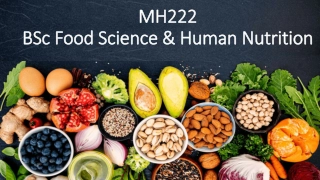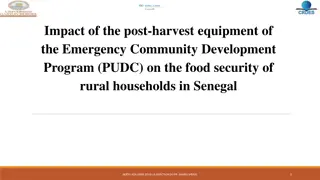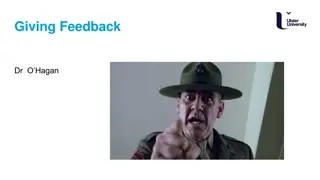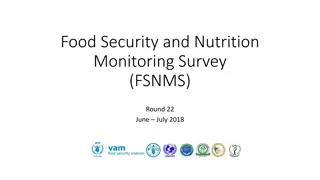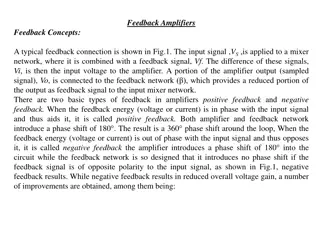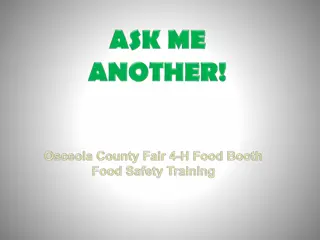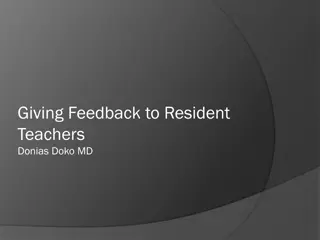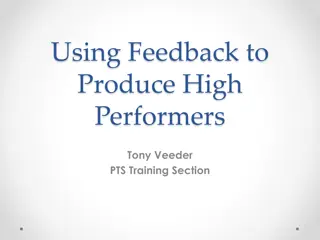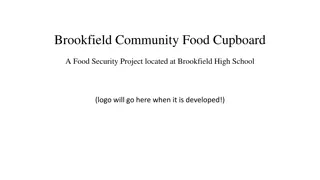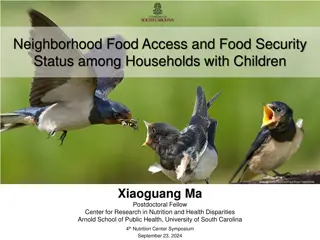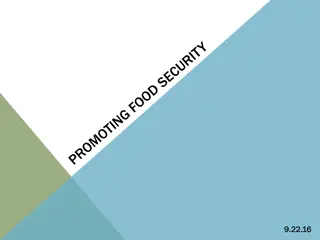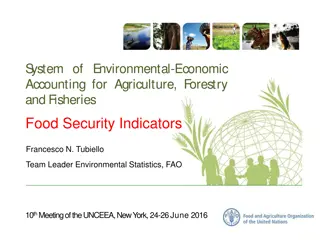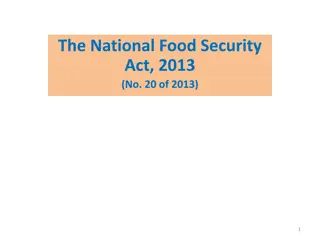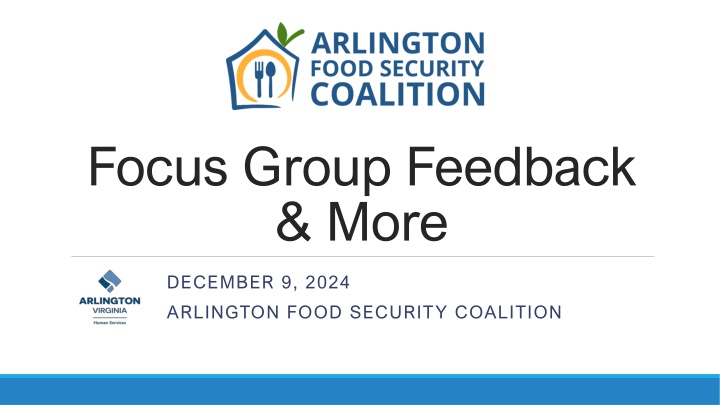
Arlington Food Coalition: Focus Group Feedback & Strategic Plan 2024
Discover the insights gathered from focus groups regarding food security in Arlington. Explore the 2024 Strategic Plan Annual Report and learn about the initiatives and progress made towards addressing food assistance needs. Engage with diverse populations through the priorities set to enhance community well-being.
Download Presentation

Please find below an Image/Link to download the presentation.
The content on the website is provided AS IS for your information and personal use only. It may not be sold, licensed, or shared on other websites without obtaining consent from the author. If you encounter any issues during the download, it is possible that the publisher has removed the file from their server.
You are allowed to download the files provided on this website for personal or commercial use, subject to the condition that they are used lawfully. All files are the property of their respective owners.
The content on the website is provided AS IS for your information and personal use only. It may not be sold, licensed, or shared on other websites without obtaining consent from the author.
E N D
Presentation Transcript
Focus Group Feedback & More DECEMBER 9, 2024 ARLINGTON FOOD SECURITY COALITION
2024 Strategic Plan Annual Report 2024 Strategic Plan Annual Report Data and context about the past year in relation to food assistance need and services. Progress towards implementation of strategies from the strategic plan. Includes coalition and mini-grant projects Includes quotes from focus groups related to the strategies in the plan. Available at https://www.arlingtonva.us/Government/Departm ents/DHS/Food-Assistance/Food-Assistance- Documents#section-2
Focus Group Focus Group Overview Overview
Hear from people about their current experiences getting groceries. 1 Understand more about financial pressures. Verify our hypothesis that increased numbers at food pantries are a result of inflation. 2 Priorities Priorities Hear from various populations and geographies in Arlington. 3 Compensate all participants for their time and contributions. 4
Focus group partners Focus group partners DHS Community Outreach Program (via the Diaper Bank) Glebe Elementary School Our Lady Queen of Peace food pantry Gates of Ballston (AHC) DHS Lived Experience(d) Advisory Council Social 60+ Caf at Walter Reed Community Center Arlington Free Clinic Day Laborers Green Valley (Bridges & AHC) Ashlawn Elementary School
Participants Participants 84 residents 17% over 60 years old 69% female, 31% male Average time in Arlington: 14 years Race/Ethnicity of Participants White 1% Zip Code Zip Code Indian 1% Asian 1% Outside of Arlington, 5% 22202, 10% Ethiopian 7% Arabic 7% 22207, 14% 22203, 12% Black 16% 22206, 12% Hispanic 67% 22205, 10% 22204, 38%
Questions & Questions & Objectives Objectives FOCUS GROUP HIGHLIGHTS
Questions Questions 1. 1. What is your name? How long have you lived in Arlington? What is your name? How long have you lived in Arlington? What is your favorite food? What is your favorite food? 2. 2. Can you tell us about the different ways you access food for yourself and Can you tell us about the different ways you access food for yourself and your family? your family? Do you go to food pantries and/or grocery stores? How do you get there? Do you use WIC and/or SNAP? What makes getting groceries difficult? OBJECTIVE: OBJECTIVE: Get a bigger picture of how retail, assistance programs, and pantries fit into food budget. Identify barriers to getting food.
Questions Questions 3. 3. How do you decide what foods to get/eat? How do you decide what foods to get/eat? Are you able to get the right foods for you (and your family)? Have you changed what you eat for your health? Do your children eat the meals provided at school? Do you adjust the foods you get to make it through the week/month? How does your kitchen space or time for cooking factor into your choices? OBJECTIVE: OBJECTIVE: Understand how food preferences, availability, cost, and health concerns factor into diets.
Questions Questions 4. 4. Can you share some of the financial challenges you face when it comes to Can you share some of the financial challenges you face when it comes to getting food? getting food? Have you recently had to make choices between paying rent, bills, medical expenses, or buying food? What adjustments have you made to meet your needs? How have things changed over the past couple of years? OBJECTIVE: OBJECTIVE: Identify current pressures to finances. Is it mostly inflation or are other factors at play as well?
Questions Questions 5. 5. For those who said they get SNAP/WIC or go to a food For those who said they get SNAP/WIC or go to a food pantry, what made you decide to try it? How did you hear about these programs? you decide to try it? How did you hear about these programs? How have they impacted you? pantry, what made OBJECTIVE: OBJECTIVE: Identify communications avenues that are working, attitudes towards accessing assistance, and positive program impacts. 6. 6. For those who do not use SNAP, WIC, or food pantries, what are some For those who do not use SNAP, WIC, or food pantries, what are some reasons you might be hesitant to try them? If you've tried before, what reasons you might be hesitant to try them? If you've tried before, what challenges did you face? challenges did you face? What has made it difficult, if you ve thought about it or tried before? What concerns do you have about participating? OBJECTIVE: OBJECTIVE: Identify barriers to accessing assistance.
Focus Group Focus Group Highlights Highlights
Rent and all prices have gone up a lot recently and are making budgets hard to manage. Employment can be hard to come by and weather-dependent, making incomes unstable. People are trying to do their best to eat healthy. Vegetables and meat are key diet components. Big Take Big Take- - Aways Aways Shoppers are savvy and shop deals to get the most for their money. Food pantry participation helps keep money for rent and reduces the grocery bill dramatically. Bad experiences can cause years of ripple effects. Perceived injustices and inequities create bad sentiments. Trusted sources, like clinics, help people get connected to resources.
Housing Inflation Employment Topics Topics Grocery Shopping Food Preferences Getting Food Food Assistance Good & Bad Experiences Communications Other
Housing Burden Housing Burden Paying rent is the top priority and it keeps increasing. Rent takes the majority of people s incomes, leaving little for other expenses. First, we pay rent and it takes most of our income. We ve needed help on rent before. (Diaper Bank-Spanish) First you have to pay rent. There s not much left after that. (OLQP) I try to reduce spending outside of rent to make sure I have enough to pay my rent each month. (Day Laborers)
Housing Realities Housing Realities High rents cause many households to share apartments. Sometimes extended family lives together. Often separate households rent rooms/sections of the house/apartment. Kitchen access can depend on your lease agreement or arrangement with other households as to who uses the kitchen when. Lots of people share apartments because the rent is so high. If you re renting just a room, you might have access to the kitchen or no. When that s the case, you have to take turns in the kitchen. If it s not your turn, you might have to eat out if you want to eat. (AFC) I rent a room in a basement. There are a few rooms and each have a person and then there are a bunch of people living in the main room too. It s definitely not up to code. (Day Laborers)
Rising Costs Rising Costs Everything is more expensive. Groceries are noticeably more expensive. Wages haven t kept up, specifically minimum wage. It s difficult to get groceries at the store. Our money doesn t make ends meet. It s not enough. (AFC) The price of food is astounding. I used to pay $50 and get big bags of food. Now I pay $100 and get 3 things. (Social 60) Everything has gone up, but wages haven t. It s harder to afford things. (AFC) Since Covid, life became different, and it is getting harder everyday to afford the rent and bills and basic needs. We sometimes don t eat much to afford the kid s needs. (Arabic) In Arlington you can make $100K and still be in poverty. (Formerly Unhoused)
Employment Employment Jobs are hard to come by. It s been hard to find a job. This summer was really bad. Normally work is more available in the summer, but this year that wasn t really the case. In winter it s harder because there s less work. No one is painting the outside of their house in the winter. Bosses aren t really picking up lots of guys from the corner anymore like they used to. (Day Laborers) Things have changed A LOT in the past few years. After the pandemic, everything changed. Before it was easy to work. I could pick up extra shifts to earn extra money. Now it s very inaccessible to get work. There aren t any extra shifts to pick up. There are lots of people immigrating here and there aren t as many available jobs. (AFC) The big companies are now asking for papers. I ve worked at a company for 15 years and they never asked for papers before, but now they have been for the past year. They just fired 20 people. (Ashlawn) Some jobs like their own kind, so it s hard for people like me to get a job. That s just how it is. (Green Valley)
Employment Employment Cold and wet weather means less work for many fields: construction, landscaping, restaurants, etc. This is when people often reach out for help out of desperation if they aren t already connected to support resources. Often only one adult in the family is working (mom is often home with young kids), so if the wage winner is out of work for the whole season, there is almost no income. Most of us work in restaurants if the restaurant isn t doing well or has lower traffic, we get fewer hours. In winter, we get fewer hours. Same with construction winter/rain = fewer hours, which means less money. (Glebe) In winter, my husband didn t have work for 2 months because he works in construction. That s when we finally got help. (Diaper Bank-Spanish) SNAP [Able Body Without Dependents] work requirements are ridiculous if I don t get 20 hours/week it s not my fault. (Formerly Unhoused)
Getting Food Getting Food FOCUS GROUP HIGHLIGHTS
Grocery Shopping Grocery Shopping Shoppers choose stores based on price, convenience, and sales. Aldi was the most commonly mentioned store, but residents shop in many places. Some avoid certain stores due to higher prices or lack of sales. Food from food pantries is a big help. Some use insurance benefits, like the United Healthcare Ucard, to buy food and cover delivery fees. I use my smart phone to shop sales. I find the best deals and spend my SNAP benefits carefully. If I don t it ll all be gone quickly and won t help as much as it could. (AFC) I don t go to Latin markets because they are more expensive. Things are always the same price there. They don t have sales. At American supermarkets they have buy one get one free sales and other sales that make things more affordable. (AFC) I try to use what I have, see what s cheap, buy what s necessary or what I m missing. I bring a short list when I go shopping. Try to buy just a few things. (Diaper Bank-Spanish)
Food Pantries Support Food Budgets Food Pantries Support Food Budgets Many start with what they get from food pantries and then shop for the rest. Day Laborers rely heavily on free grocery (AFAC, OLQP) and meal programs (Assembly of God, Provision Church, bagged lunches) and are able to generally meet their food needs. They tended to only grocery shop for a few things that aren t provided (ex: water, coffee, sugar). (Day Laborers) Some share excess food with friends or avoid waste by not taking more than needed. I m at AFAC every week without a doubt. (Diaper Bank-Spanish) When I m not able to work as much, getting bread and eggs is a real benefit. (OLQP) We re only a family of 3. What we get from AFAC and WIC is mostly enough. I just get a few things from the store once a week. (Diaper Bank-Spanish) If the food I get from here lasts for 2 weeks, then I don t have to come for a week. I don t want to get too much and have it go to waste. (OLQP)
Family/Cultural Food Preferences Family/Cultural Food Preferences Many try to prepare and eat healthy foods, especially for their children. Vegetables are commonly provided by food pantries and are a staple in their diets. Meat and milk are the hardest items to get from food pantries. People often have to be creative to make limited meat supplies stretch. Arabic participants wanted to see more Halal products and be able to substitute foods at the food pantries. Many people mentioned making food choices based on their kids preferences. I m not used to cooking beans, but I ll eat them, I m not allergic. It s just not a traditional food from my culture. We eat more meat, soup, and fish. (OLQP) Vegetables are the most accessible. Most food pantries always provide vegetables, so we incorporate them a lot. (Glebe) Going to AFAC once a week you only get 1 meat and that s not enough for a week s worth of meals. (Formerly Unhoused)
Food for Health Food for Health Most strongly value fruits and vegetables in their diets and lament when they aren t accessible. Providing balanced meals can be difficult due to cost. Dietary constraints compound food insecurity because lower cost foods and foods that are provided readily by food pantries are not conducive to controlling diabetes and other chronic diseases. The doctor says you have to eat healthy. Those things are expensive. If I only ate what they say I should eat, my money wouldn t last for the two weeks it needs to last. (AFC) It s a bit more expensive for that kind of food (less processed, etc), but if you don t pay now, you ll pay later and it s not cheap. (Formerly Unhoused) It would be much better if they had a separate menu of food for people with diabetes (or other conditions) who go to the food bank. (AFC) We buy what we can afford, not necessarily what s best for us. (AFC) What they give you at the food bank (rice, beans, cans) it s mostly carbs. (AFC)
Government Programs Government Programs - - Positive Positive WIC and SNAP are crucial for many, helping with essentials like milk, fruit, and formula. WIC, in particular, received lots of positive comments. SNAP usage can vary some spend it all at the beginning of the month, others spend it carefully throughout the month. The first iteration of Summer EBT (SUN Bucks) was positive. When I got insurance, the worker told me I could get SNAP too. I have two kids to feed. What I was able to buy wasn t enough. The social worker helped me apply for SNAP. It s for the kids, so I use it to buy things for them. (AFC) Summer EBT It was a big help for us. The card arrived and it was clear what it was. We could use it anywhere we shop. (Ashlawn) WIC helped a lot with formula. I like that I can choose various items [milk, cereal, fruit]. (Glebe)
Government Programs Government Programs - - Negative Negative Many begrudge not being eligible to participate because of income, citizenship, or other eligibility factors. There are challenges with eligibility, work requirements, and keeping up with program rules. The requirements to get/keep SNAP make it difficult. If you earn too much money you don t get anything [benefits] and the income limit is so low, so I don t qualify for anything. (Glebe) You have to keep in touch with your case manager as income changes. It s a full-time job to keep up with them. (Formerly Unhoused) Rules change all the time. (Formerly Unhoused) They need to extend eligibility for SNAP to non-citizens. We need to eat too. (AFC) I don t want the government to say Spanish people need help. (OLQP)
Bad Experiences Bad Experiences Transportation issues, long lines, and unfriendly volunteers deter some from using pantries. Some of the bad experiences mentioned seem to reference situations 5+ years ago, implying that one bad experience can keep someone from using resources for years afterwards. Some have had negative experiences with expired food, spoiled items, or lack of Halal items. I had a bad experience with trying to get AFAC and Medicaid, so I make it by without AFAC now. (Glebe) I applied for SNAP at DHS. I went again and again and each time they asked for something else (pay stubs, lease, etc.). After all of that, they still told me I wasn t eligible. It was so frustrating! When AFAC told me I had to go to DHS to renew my account, I didn t want to go there, so I didn t renew. (AFC) Few clients tried it but mentioned that most of the foods are expired cans and they prefer fresh vegetables and fruits. They added that the long lines are pushing them away. The volunteers sometimes are unfriendly. They don t allow food substitution and they don t have Halal food. (Arabic) If you go, they treat you bad. It makes you feel bad when you re already down. It s so hard on you psychologically. (AFC)
Fear Fear Rumors continue to abound about being connected to government or private programs. This will likely get worse under the new administration. REMINDER: REMINDER: AFAC & all other Arlington food pantries serve ALL, regardless of immigration status. Federal food assistance programs don t affect public charge. Arlington County will not share identifying information with ICE. We tried not to ask for help because we heard that if we signed up for these programs (AFAC, SNAP, WIC, etc.) they ll take your kid. If you sign up for AFAC or WIC, they ll know all of your information and will take your kid away. (Diaper Bank-Spanish)
Perceived Inequities Perceived Inequities There were a fair amount of Me vs. You sentiments. Common thoughts were that other people are getting more than they should be allowed. Some thought that people are getting the free food and then cooking it to sell, which isn t fair. Lots of the programs are targeted at Latinos. There are a lotta folks looking out for their folks. Like there s an organization that will help get you $ to get a food truck, (but that does not seem to be available to me.) (Formerly Unhoused) People at the front had 3-4 tickets, they get food for their friends who don t have to wait in line. They take all of the good things and there s not enough for others who are waiting. (AFC) There needs to be more requirements so people only get food if they need it. People are lying if they say they re getting for 2 families. (Day Laborers)
Transportation Transportation Many depend on buses for transportation, prioritizing funding for their SmartTrip cards. Some use a taxi or retiro to get home from the grocery store. About half of the Day Laborers used bikes as their primary mode of transportation. Medicaid can arrange transportation to the grocery store with advance notice. About half of participants had their own cars, but many were cautious about using too much gas. A friend or family member [husband or children] will get the things I need, or they will take me shopping. (Social 60) I can t even lift myself, much less bags of groceries (Social 60) I take the bus and then a taxi to get home. (Formerly Unhoused)
Communications Communications FOCUS GROUP HIGHLIGHTS
Trusted Sources Trusted Sources Word of mouth is powerful. Clinics and other trusted social workers are powerful connectors and myth-busters. Finally, the pediatric clinic said it was okay to sign up for these programs and got me signed up. (Diaper Bank Arabic) The person at the Free Clinic told me about AFAC and got me signed up. (AFC) Mario at SEEC explained it more, helped me register for AFAC, get connected to VHC Outpatient Center for prenatal care. They registered me for WIC. (Diaper Bank Spanish) Susan (COP) has helped so much. I sometimes bring her a bill that I receive and don t understand and she explains it to me. (Diaper Bank Spanish) I tell other guys about food distributions, remind them when it is. Friends will tell each other about what s available. (Day Laborers)
Communication Preferences Communication Preferences Flyers are good be concise. People often use their own shorthand for places, ex: Shirlington = AFAC It s good to get a paper with resources. Some we know, others we don t. We can share with others. (Day Laborers) For flyers, most people just want to know the what, where and when and then don t read the rest. (Green Valley) Yeah, I look at things posted at the bus stops while I m waiting for the bus. (Ashlawn)
Other Information Other Information FOCUS GROUP HIGHLIGHTS
Why Stay In Arlington Why Stay In Arlington Despite the high cost of living, many prefer to stay in Arlington for its tranquility and safety. Once you get accustomed to living a tranquil live, you don t want to leave. It s calm here. There are no gangs. (Day Laborers) I know there are other places to live that are maybe more affordable, but I can t leave because of the schools. They re good for my children. (AFC) We ve lived here for a long time and don t plan to move. North Arlington schools are more secure and safer. (Glebe)
Other Memorable Comments Other Memorable Comments We d like to get a little something extra, but there isn t the money to cover it. (Diaper Bank-Spanish) I feel like the stigma has been reduced recently. Prices are high for everyone and everyone is open to getting some help. Every little bit helps. (Green Valley) I work in a school. My kid eats breakfast and lunch at school. They have a share table at school. I eat some of the extras that are there and take home things that are left at the end of the day. (OLQP) If it wasn t for the [Assembly of God] church, we d be in bad shape. (Formerly Unhoused) We ve got groceries, kids, toilet paper, all sorts of things we have to pay for. (Green Valley)
Next Steps Next Steps FOCUS GROUP HIGHLIGHTS
Completed Actions Completed Actions Included quotes in the strategic plan annual report. Shared some highlights with ARLnow reporter. Contacted Arlington Agency on Aging with feedback from Social 60+ caf participants about their desires about meals more fresh fruits/vegetables, labeled meals, etc. to follow up with caterer. Sent info on Capital Bikeshare for All to SEEC and COP. Reached out to OLQP to support Ashlawn ES families in similar way to Glebe ES. Contacted DHS staff who work with shelters to follow up on PathForward about lack of fresh fruits/veg at the shelter and comments about RPC food vendor.
To Dos To Dos Reach back out to participants via WhatsApp or coordinator to get feedback on new flyer version (if interested). Build relationships with trusted resources, especially the clinics. Share this summary with others in the county. What s the best way to do this? Work with volunteers on prioritizing being friendly and welcoming to all. Possible PSA campaign to combat rumors/misconceptions/fear. Explore ways to best support those with medical dietary constraints.
Questions & Questions & Discussion Discussion FOCUS GROUP HIGHLIGHTS

